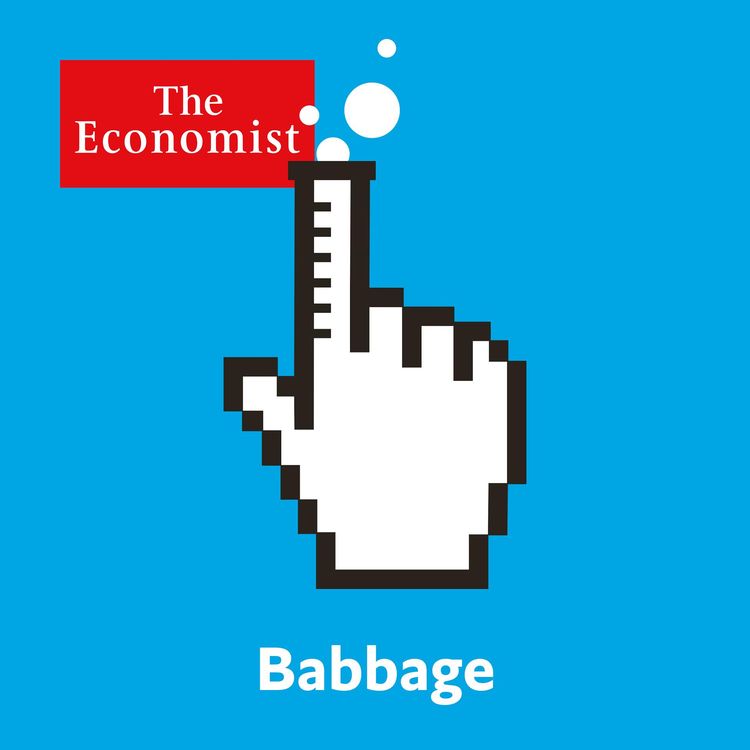Share

Babbage from The Economist
Babbage: Hard reboot
•
Intel is the world’s biggest chipmaker. So why is it underperforming—and can its new boss turn the company around? As the search for life on Mars hots up, astrophysicist Avi Loeb argues science has already detected evidence of intelligent extraterrestrial life. And, why parents of daughters are more likely to divorce than those with sons. Kenneth Cukier hosts
Please subscribe to The Economist for full access to print, digital and audio editions:
More episodes
View all episodes

Richard Cytowic: the human brain in the digital age
27:01|In the 1980s Richard Cytowic, a neurologist, came across a patient whose senses seemed to blur into one another. His research into this strange condition defined the modern understanding of what would come to be known as synesthesia. In his latest work he’s been taking on the digital age. His new book considers how humans’ slow-to-evolve brains are at odds with an ever-changing technological environment. As the world gets relentlessly more digital, Professor Cytowic considers the impact of all that information on our attention spans, learning, and even the ability to form human connections.Hosts: Alok Jha, The Economist’s science and technology editor. Contributor: Richard Cytowic, professor of neurology at George Washington University and the author of “Your Stone Age Brain in the Screen Age”.Transcripts of our podcasts are available via economist.com/podcasts.Listen to what matters most, from global politics and business to science and technology—subscribe to Economist Podcasts+.For more information about how to access Economist Podcasts+, please visit our FAQs page or watch our video explaining how to link your account.
Early onset: why is cancer on the rise in younger people?
38:50|The number of people under 50 being diagnosed with cancer has risen dramatically in recent decades. Many cases cannot be explained by a family history of disease or any lifestyle factors—such as smoking, drinking or unhealthy foods—that would otherwise put the individuals at a higher risk. Explaining this rise in early-onset cancer has therefore presented a conundrum. But clues are now emerging—is there some kind of exposure in the environment that could perhaps explain some of the cases?Host: Alok Jha, The Economist’s science and technology editor. Contributors: Ann Young, who was diagnosed with breast cancer in her 30s; Mike Stratton of the Wellcome Sanger Institute; Slavea Chankova, The Economist’s health-care correspondent. Thanks also to Meg Bernhard, who wrote about Ann’s story in The Economist.Transcripts of our podcasts are available via economist.com/podcasts.Listen to what matters most, from global politics and business to science and technology—subscribe to Economist Podcasts+.For more information about how to access Economist Podcasts+, please visit our FAQs page or watch our video explaining how to link your account.
Herman Pontzer: what people get wrong about metabolism
35:26|Do you run, cycle or swim to lose weight? Herman Pontzer, an evolutionary anthropologist who specialises in understanding how humans use energy, thinks you’re probably wasting your time. His idea of the “exercise paradox” suggests that the amount of energy people use in a day is constrained (by evolution) and that exercising more doesn’t end up burning more calories. Figuring out why our bodies work like this is part of Prof Pontzer’s bigger project to map out and better understand how evolution has shaped variations in human biology. Hosts: Alok Jha, The Economist’s science and technology editor. Contributor: Herman Pontzer, professor of evolutionary anthropology and global health at Duke University and the author of “Burn” and “Adaptable”.Transcripts of our podcasts are available via economist.com/podcasts.Listen to what matters most, from global politics and business to science and technology—subscribe to Economist Podcasts+.For more information about how to access Economist Podcasts+, please visit our FAQs page or watch our video explaining how to link your account.
Trailer: Boss Class Season 2
02:03|Good bosses are rare. They don’t have to be. The skills of management can be learned.The Economist’s management columnist, Andrew Palmer, is here to help. The second season of Boss Class features leaders at some of the world’s best performing companies, from Levi’s to Novo Nordisk to Google. New episodes are out weekly starting May 12th. To listen to the full series, subscribe to Economist Podcasts+. https://subscribenow.economist.com/podcasts-plusIf you’re already a subscriber to The Economist, you have full access to all our shows as part of your subscription. For more information about how to access Economist Podcasts+, please visit our FAQs page or watch our video explaining how to link your account.
Material world: should you worry about microplastics?
41:30|Few materials have had such an influence on humanity as plastic. But as a result, tiny fragments, known as microplastics, have become ubiquitous in the environment. They have been found in Earth’s most pristine environments, from Antarctica to the deepest ocean trenches. And researchers have even detected microplastics in human blood and breast milk, and in organs such as the heart and the brain. How worried should you be about their impact on human health?Hosts: The Economist’s Alok Jha and Gilead Amit. Contributors: Mark Miodownik of University College London; Douglas Walker of Emory University; and The Economist’s health-care correspondent, Slavea Chankova. Read more about new ways to recycle plastic and how to manage waste better.Transcripts of our podcasts are available via economist.com/podcasts.Listen to what matters most, from global politics and business to science and technology—subscribe to Economist Podcasts+.For more information about how to access Economist Podcasts+, please visit our FAQs page or watch our video explaining how to link your account.
Well informed: which foods should you avoid?
37:55|The internet is awash with clever fitness hacks, fad diets and home remedies that claim to help you live a longer, healthier and happier life. But how well do these promises hold up to scientific scrutiny? And what about the vices you’re told to avoid? This week, our correspondents consider the evidence on three types of food that have been linked to health concerns: butter, ultra-processed foods and red meat. How bad for you are they, really?This episode is part of our new “Well informed” series on Babbage. Every few months we’ll scrutinise the evidence behind some of the health or wellness trends making headlines. Host: Alok Jha, The Economist’s science and technology editor. Contributors: The Economist’s Ainslie Johnstone, Shailesh Chitnis and Slavea Chankova.Subscribers to The Economist can find “Well informed” articles on our website or app every Saturday.Transcripts of our podcasts are available via economist.com/podcasts.Listen to what matters most, from global politics and business to science and technology—subscribe to Economist Podcasts+.For more information about how to access Economist Podcasts+, please visit our FAQs page or watch our video explaining how to link your account.
Power play: will AI help or harm the climate?
38:58|The race to build better AI systems is having an ever-bigger impact on the environment. Data centres, which store and process the information required to train and operate AI models, currently account for around 2% of global electricity consumption. That figure will rise, as new facilities are built to accommodate ever more energy-hungry machine learning. But AI could also help reduce emissions, for example, by optimising electricity grids, detecting methane leaks or developing better battery materials. So, will AI be bad for the environment…or will it turn out to be good?Host: Alok Jha, The Economist’s science and technology editor, with AI writer Alex Hern. Contributors: Sasha Luccioni of Hugging Face; Boris Gamazaychikov of Salesforce; and Ronnie Chatterji of OpenAI.Transcripts of our podcasts are available via economist.com/podcasts.Listen to what matters most, from global politics and business to science and technology—subscribe to Economist Podcasts+.For more information about how to access Economist Podcasts+, please visit our FAQs page or watch our video explaining how to link your account.
Rocket man: Elon Musk’s plan to put people on Mars
40:14|President Donald Trump has announced that he wants to send Americans to plant the Stars and Stripes on Mars. The only rocket which currently stands any chance of making that happen is the enormous spacecraft being developed by Elon Musk, one of the president’s new advisors. Mr Musk has pledged to send uncrewed missions to Mars by the end of 2026, ahead of the first astronauts in early 2029—just before President Trump is supposed to leave office. But many challenges remain. Will his company, SpaceX, be able to make its Starship rocket work in time? Host: Alok Jha, The Economist’s science and technology editor, with senior editor Oliver Morton. Contributors: Peter Hague, an astrophysicist who writes the “Planetocracy” blog; Volker Maiwald an engineer at the German Aerospace Centre.For more on this topic, check out an episode from last year which examined Starship’s role in the US-China Moon race. Also, as an Economist subscriber, listen to our recent episode of “Checks and Balance” which asks whether Elon Musk is remaking America’s government or breaking it.Transcripts of our podcasts are available via economist.com/podcasts.Listen to what matters most, from global politics and business to science and technology—subscribe to Economist Podcasts+.For more information about how to access Economist Podcasts+, please visit our FAQs page or watch our video explaining how to link your account.
Humanity 2.0: the rise of the superhuman
44:59|From drugs to gene editing and brain implants, modern biotechnology has the potential to make humans stronger, more intelligent and perhaps even live longer. These ideas have largely existed at the fringes of scientific research, however, championed by eccentric billionaires whose aims include evading death. But investment and interest in human enhancement is growing—and some of those billionaires have now reached the heart of political power in America. How can human enhancement research be brought into the mainstream, so that it could one day benefit everyone?Host: Alok Jha, The Economist’s science and technology editor, with health editor Natasha Loder. Contributors: Aron D'Souza of the Enhanced Games; Charles Brenner of City of Hope National Medical Center; Arthur Caplan of New York University Grossman School of Medicine; and Bryan Johnson, a tech entrepreneur and self-declared “rejuvenation athlete”.If you enjoyed this, listen to The Weekend Intelligence’s episode on human growth hormone. How far would you go in the pursuit of perfection? Transcripts of our podcasts are available via economist.com/podcasts.Listen to what matters most, from global politics and business to science and technology—subscribe to Economist Podcasts+.For more information about how to access Economist Podcasts+, please visit our FAQs page or watch our video explaining how to link your account.